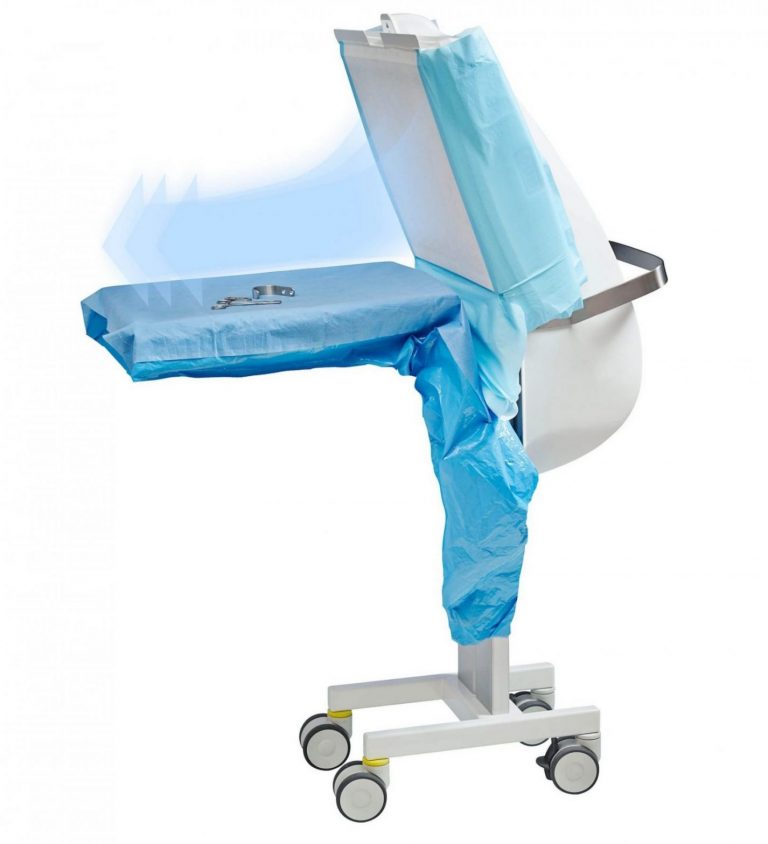
SURGERY OF PREMATURE INFANTS with aseptic conditions via Operio mobile laminar air flow with hepa filter system
Surgery performed in the neonatal intensive care unit (NICU) can be performed under strict aseptic conditions with a mobile laminar air flow in combination with hepa filter system in a microprimie that prevent the potential instability of the tiny fragile patient if transferred to an operation room outside the NICU.
The sterile Air Flow device Operio filters the ambient air through a highly cleaning H 14 Hepa filter with an efficiency of over 99.995% which eliminates bacteria and microorganisms to over 99.9%! The devices can be positioned in such a way that a “germ-free zone” is set up that creates the greatest possible aseptic condition – even during operations on the ward. The devices creates an ultra-clean, aseptic zone for the operating field and the instruments without changing the room temperature.
The devices filter 400 m3 of air per hour so that the microorganisms are reduced in the entire room.
The devices generate an asepsis on the instruments and the operating field (and that is what counts!) which is comparable to an ISO 5 operating room, since the sterile air flow protects the instruments and the operating field directly and without any obstacles such as the operating room -lights or surgical team.
Aseptic conditions for surgery and emergency operations on premature babies
Operio generates an asepsis on the instruments and the operating field (and that is what counts!) which is comparable to an ISO 5 operating room, since the sterile air flow protects the instruments and the operating field directly and without any obstacles such as the operating room -lights or surgical team. The decisive fact for the occurrence of postoperative wound infections is the contamination of the operating area and the instruments / implants with pathogens during the duration of the surgical procedure. The effectiveness of antibiotics is reduced more and more by the increase of multi-resistant infectious agents; the success of the therapy expected from the use of antibiotics is becoming more and more difficult due to antimicrobial resistance.
Impeccable hygiene conditions are essential for operations on premature and newborn babies. However, many of these operations have to be carried out on the NICU because transport to an operating room is too dangerous. The mobility of the devices and the favorable price now also enable sterile conditions to be created directly on the ward. The devices can be used immediately without any modification work. Special devices in the room are not required because the device only has a connection value of 290 W and can therefore be easily attached to any normal socket. The devices do not generate cold air and can therefore also be used during operations with an incubator to maintain the aseptic conditions of the instruments and the room.
Generally, premature newborns are more or less immunodeficient, and this condition worsens with medical conditions that require long hospitalization times, such as intubation and ET suctioning, parenteral nutrition and intravascular catheters; these procedures are often carried out on the new-born at the same time, and this increases the risk of contracting hospital infections.
Right after being born, these tiny patients come into contact with the contaminants in the environment, in their nourishment, on the equipment and on people.
Although they stimulate a specific immune response, these contacts may also promote the onset of infections that the new-born may not be ready to contrast yet. Indeed, their immune system increases slowly during the first months of life, and completely develop between the first and second year of age.
Reducing the possibility that the newborn can contract infections is very important, and this can be done by strengthening the hygiene measures as much as possible, and favouring the use of sterile materials inside strictly aseptic areas, whenever possible.
Some of the children treated in the NICU require surgeries, and therefore are transported from the NICU to the operating theatre.
If the newborn is too small, the transportation procedure may cause brain injuries; however, Operio can be quickly placed anywhere and generate a strict aseptic environment – even in the NICU – in just a few seconds, thus creating optimal conditions from an air sanitization standpoint, to perform the surgery safely and without moving the child.
For children with sternotomy, it is essential that the area they are placed in – sometimes even for weeks – is sterilized. The laminar flow protects them against bacterial contamination and creates an aseptic environment around them.
Benefits
Surgery of highly aseptic conditions for with sterile conditions
mobile- non installation required
eliminates bacteria and micro-organisms (including coronavirus covid 19) by over 99.9%
no temperatur difference
highly aseptic conditions for surgery on premature infants
Related products

Operio portable laminar air flow
TOUL Operio focused laminar air flow is a device that can be used in any environment: from operating rooms to clinics.

Operio portable laminar air flow
TOUL Operio focused laminar air flow is a device that can be used in any environment: from operating rooms to clinics.
Go to product
 it
it en
en fr
fr de
de
